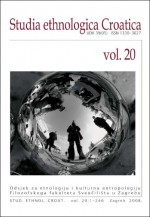Između politike pokreta i politike znanja: Feminizam i ženski/rodni studiji u Hrvatskoj, Bosni i Hercegovini i Sloveniji
In-between the Politics of Movement and the Politics of Knowledge – Feminism and Women's/Gender Studies in Croatia, Bosnia and Herzegovina and Slovenia
Author(s): Sanja Potkonjak, Damir Arsenijević, Ajla Demiragić, Jelena PetrovićSubject(s): Gender Studies, Geography, Regional studies, Cultural Anthropology / Ethnology, Higher Education
Published by: Sveučilište u Zagrebu, Filozofski fakultet
Keywords: Women’s/Gender studies; Institutionalization; Academy; Activism; Croatia; Bosnia and Herzegovina; Slovenia;
Summary/Abstract: Gender questions and disturbs, shakes up the entrenched prejudice and conformist stance, while offering no guaranties in relation to the outcome of transformative politics. This article offers a vision that aims to go beyond the state of disappointment and stubbornness, which many feminist scholars have felt in the last decade and a half. In this vision, personal relationships continue to have a prominent role in finding the alternative routes for discussing emancipatory politics in feminist theory and criticism. These personal relationships do not in any way build a secluded safe-haven, but rather give us an impetus for more developing collaborative ways of knowledge production and exchange, and taking concrete steps in establishing and fostering gender studies in the region of former Yugoslavia. These are ‘epistemological cells’, mobile and technologically-savvy, not eschewing confrontations with the entrenched academia, and at the same time promoting critical thinking and academic research. We make no compromises with what already exists, while at the same time we claim our right to enter the existing institutions. This way, we create our audiences and our partners in knowledge production of gender studies. Our aim is to set up regular academic exchanges: through conferences, joint research projects and publications, external examining, visiting lecturing, joint journal editorial-board memberships. This will set a platform for creating theory and practice rooted in local/comparative specificities in such a way that new theory emerges from local practices and insights, which are too painful and embarrassing for the dominant ideologies to deal with and as such need to be repressed. However, we are aware that local specificities are just another name for the fetishizing of difference, so dear to the depoliticizing stance of multiculturalist politics. All new theoretical reflection on emancipatory politics of concrete material practice must be linked to other, similar practice internationally. It is also in this sens that we, the traveling scholars, claim the means of knowledge production internationally: we make the world the home of our theory and critique. This is all the more important in the regional context wherein any critique is dampened by conformist individualism, all too easily eager to supply the fashionable demand of the market, and any theoretical discussion is completely discouraged in favor of pragmatic approaches. Aware that there must be no theoretical compromises made, it would be helpful to recall Lenin that without revolutionary theory there can be no revolutionary movement’. Ready to engage in the ‘art of the impossible’ (Žižek 1999:199) that politics actually is, we aim to intervene in the academia in such a way so as to put forward a different possibility, together in solidarity, without any guarantees.
Journal: Studia ethnologica Croatica
- Issue Year: 2008
- Issue No: 20
- Page Range: 57-96
- Page Count: 40
- Language: Croatian

